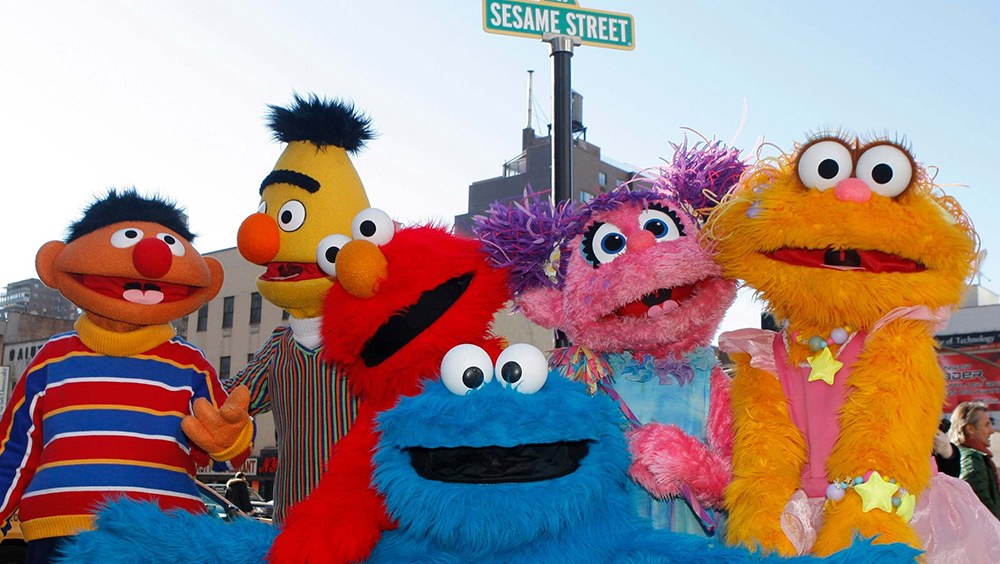Free Expression on Sesame Street: Celebrating 55 Years of the Iconic Show

Why do millions of adults and children around the world ask, “Can you tell me how to get / how to get to Sesame Street?”
Because it’s the “friendliest street in the world,” home to an iconic crew of people and Muppets like Elmo, Big Bird, Cookie Monster, the Count, Oscar the Grouch and many more.
For 55 years, the children’s television program “Sesame Street” has helped prepare kids for school and the world. In addition to the ABCs and 123s, “Sesame Street” helps parents and kids address tough topics, use their voices to be themselves, help others and befriend people who are different.
Freedom Forum is honoring the organization behind the iconic show with the 2024 Al Neuharth Award for Excellence in the Media at the annual Free Expression Awards on June 13. Sherrie Rollins Westin, president and interim CEO of Sesame Workshop, will accept the award.
“Sesame Street proved that we could reach children and give them the skills they needed to arrive at school ready to learn and thrive through this powerful medium.” – Sherrie Rollins Westin, Sesame Workshop president and interim CEO
Free expression starts with a child’s “sense of pride and belonging and security, which is so much of what Sesame gives a child,” says Rollins Westin, who joined Sesame Workshop in 1998.
The Al Neuharth Award for Excellence in the Media was first presented in 1989 to Walter Cronkite. The award is named after Al Neuharth, founder of USA TODAY and Freedom Forum.
Honorees have been pioneers in the news industry such as Gwen Ifill, Tim Russert and Judy Woodruff. The Al Neuharth Award for Excellence in the Media recognizes lifetime achievement and extraordinary leadership in the media industry. Honorees are barrier-breakers, visionaries, innovators and people who work to ensure the media reflects the diversity of the communities they serve.
As a global impact nonprofit, Sesame Workshop has produced award-winning children’s educational television programming since 1969.
Sesame Street first aired on November 10, 1969! Thank you to everyone for being a part of this journey! #HappyBirthdaySesame pic.twitter.com/ihmzCsX3lu
— Sesame Street (@sesamestreet) November 10, 2016
Sesame Workshop set out to see if the medium of television could give children access to quality early education. Its signature show, “Sesame Street” is “the first preschool program that was truly educational,” Rollins Westin says.
“Reaching children in their critical early years is the most important investment we could make in their long-term future and in all of our futures,” she says.
In its more than 50 years, Sesame Workshop has reached more than 150 million children in more than 150 countries. Rollins Westin spearheaded a partnership between Sesame Workshop and the International Rescue Committee that brings early learning and nurturing care to children whose lives are upended by conflict, reaching millions across the Middle East.
“We've often referred to our work around the world as Muppet diplomacy,” Rollins Westin says, “using the power of media and Muppets to reach children in crisis contexts” where formal schooling may not be available.
“Sesame Street” and its beloved characters like Elmo and Oscar the Grouch have captivated the hearts, minds and imaginations of generations of children.
While Elmo might only be 3 and a half years old – not quite old enough to grasp the First Amendment – the “Sesame Street” neighborhood demonstrates getting along with people who are different, like Oscar the Grouch. According to Rollins Westin, the grumpy green trash-can-dwelling monster “was created to help children understand that you could still be friends with someone who saw the world very differently from you.”
The same value supports the First Amendment concept that free speech protects a diverse range of ideas from government censorship or punishment.
“I really value that I can help my children understand that they have a right to disagree, that they can voice how they feel, as long as they are willing to listen to other perspectives and respect those differences.” – Sherrie Rollins Westin, Sesame Workshop president and interim CEO
“Sesame Street” also tackles tough issues that kids deal with, from homelessness to parental addiction, by providing resources not only to kids but also to their parents and caregivers. “Sesame Street” uses celebrities and musicians who appeal to adults through humor and parody – both examples of free expression.
As the media landscape has changed since Sesame Workshop’s inception, the team has explored more digital ways to provide resources like games, courses and webinars.
“We're able to use all forms of media, not just television, to reach children, to provide access to early education, to many who have no other access,” Rollins Westin says, including an innovative WhatsApp-based curriculum for kids in conflict zones.
“I am so proud of the work that we do at ‘Sesame Street,’” Rollins Westin says. “So often people don't understand the depth and breadth of our work all over the world in some of the most difficult places, reaching some of the most marginalized children.”
Perspective: 5 U.S. Olympic Athletes Who Flexed Their First Amendment Muscles
What Is Separation of Church and State?
Related Content
2025 Al Neuharth Free Spirit and Journalism Conference
All-Expenses-Paid Trip To Washington, D.C.
June 22-27, 2025
Skill-Building
Network Growing
Head Start On Your Future

